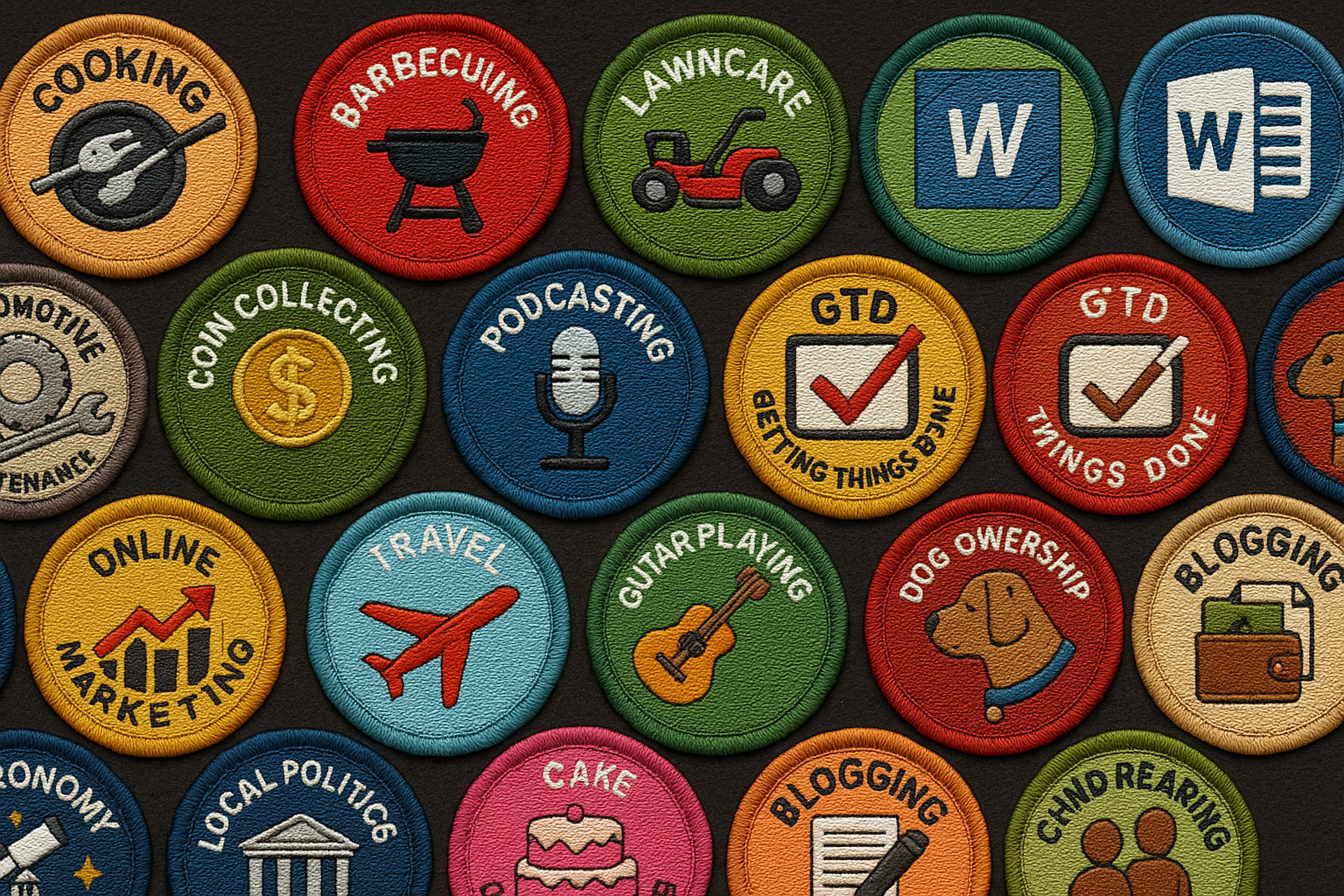This idea has been percolating in my brain for around 20 years now. I wrote the below blog post back on September 27, 2008. I’ve been thinking it may be time to get started on this project…
For a few years now I’ve had a crazy idea in the back of mind. I don’t know that it’s time to execute the idea yet, but I thought I’d post here and at least get some discussion going on the idea.
My History in the Boy Scouts of America and Activity in the Merit Badge Program
I was very involved in the Boy Scouts of America program from 7th grade through 12th grade (12 to 18 years old). The path to Eagle Scout played a major role in shaping me and preparing me for my future.
One of the things I liked most about scouting was the merit badge program. I think there were 105 available merit badges at the time. I earned 25 merit badges in all including 11 that were required for Eagle. To illustrate the broad range of areas in which merit badges are available, my merit badge sash included badges for: Basketry; Model Design and Building; Firemanship; Rowing; First Aid; Camping; Fishing; Scholarship; Emergency Preparedness; Communications; and Citizenship in the Community, Nation, and World. I believe this broad scope of learning opportunities helped me to develop an interest in all sorts of learning and made me a very well-rounded person by the time I turned 18 years old.
How Does the Boy Scout Merit Badge Program Work?
There are seven ranks in Boy Scouts: Scout, Tenderfoot, Second Class, First Class, Star, Life, and Eagle. Although any scout may earn any merit badges he wants at any time, a certain number of merit badges are required for the Star, Life, and Eagle awards. This provides motivation to earn them.
Each merit badge has a set of requirements. The requirements for each badge vary greatly but are designed to allow the scout to develop and demonstrate at least a general working knowledge in the area. Merit badges are by no means an indication that the scout is an expert in the area, but rather that he has done enough research and application to have an understanding or working knowledge in the area. For a complete list of merit badges and requirements, visit MeritBadge.org.
Once a scout decides he wants to earn a badge in a particular area he would tell his Scoutmaster. The Scoutmaster would then help the scout find a qualified person to serve as a Merit Badge Counselor to help the scout with achieving the requirements for the award. While the scout would do much of the research and work on his own, he still had to meet with the counselor to demonstrate his knowledge and skill.
After the scout completed the requirements to the satisfaction of his counselor, the merit badge would be presented at a Court of Honor–a ceremony to honro scouting achievements. The scout would then add the badge to his merit badge sash–part of his uniform that showed off his accomplishments to his fellow scouts.
Merit Badges Get Replaced in Adult Life
After scouting, there really isn’t a close replacement for merit badges. Sure, we can: read books; take classes; attend seminars; join organizations; earn certifications, licenses, and degrees; and learn as we generally experience life. However, there is nothing for adults that comes close to the fun, excitement, and stress-free opportunity available in the Boy Scout merit badge program.
What I’d Like to See In An Adult Merit Badge Program
- Available Badges – While the Boy Scout program currently only offers 121 different merit badges, I think there could be an unlimited number of merit badges in an Adult program. Here are a few ideas just off the top of my head: Cooking, Barbecuing, Lawncare, Automotive Maintenance, Microsoft Word, Coin Collecting, Podcasting, GTD–Getting Things Done, Online Marketing, Travel, Guitar Playing, Dog Ownership, Astronomy, Local Politics, Cake Decorating, Blogging, Personal Finance, Child Rearing, etc…
- The Requirements – Just as in the Boy Scouts, the requirements shouldn’t be designed to make someone an expert, but rather to ensure that the learner has a good working knowledge in the area. I believe that almost anyone who is an expert in a particular area will likely be quite capable of writing requirements. There should be some sort of review process, possibly by other experts in the field, to insure that there is some consensus that the requirements meet the working-knowledge objective and are also written in a consistent manner and style. The requirements also need to be reviewed regularly to ensure that they keep up with current technologies and social trends.
- Counselors – Unless things have changed in the last 25 years, there are no set requirements for merit badge counselors. When I earned my Computers merit badge, my Algebra teacher was my counselor. When I earned my Leatherwork merit badge, a fellow scout with leatherworking knowledge was my counselor. For many of them, I simply presented my work and demonstrated my skill to one of my scout leaders. I think that in an Adult Merit Badge program, adults should be able to seek out a counselor they feel will be able to properly assist them and answer their questions.
- The Award – The adult merit badge counselor would indicate that a particular candidate had completed all the necessary requirements for a particular award. The learner would receive some sort of certificate or other token to indicate he or she had completed the requirements. Perhaps even an icon or logo that could be put on their own web site.
How Would an Adult Merit Badge Program Be Managed and Administered?
Perhaps the reason nothing like this has been done before is because there is no system to manage and administer such a program. The Boy Scouts of America has a massive network of hundreds of thousands of volunteers to administer the program on a one-on-one level. While many people will serve in this capacity to prepare young people for their future, I’m doubtful that many adults would be likely to volunteer their time to make a similar program successful for other adults.
In this day of technology and the Internet, it might not be a huge task to create a web-based program through which it could be managed and administered. It could be a social networking type of site similar to LinkedIn, FaceBook, and MySpace. Each participant would have their own personal page to display their awards, locate others with similar interests, and to generally form community around their demonstrated skills and knowledge.
Talk with Me People!
So, what do you think? Do you think Merit Badges for Adults would be a good idea? What ideas do you have to execute the idea? How would you see something like this affecting your life? Let me know in the comments!


Leave a Reply